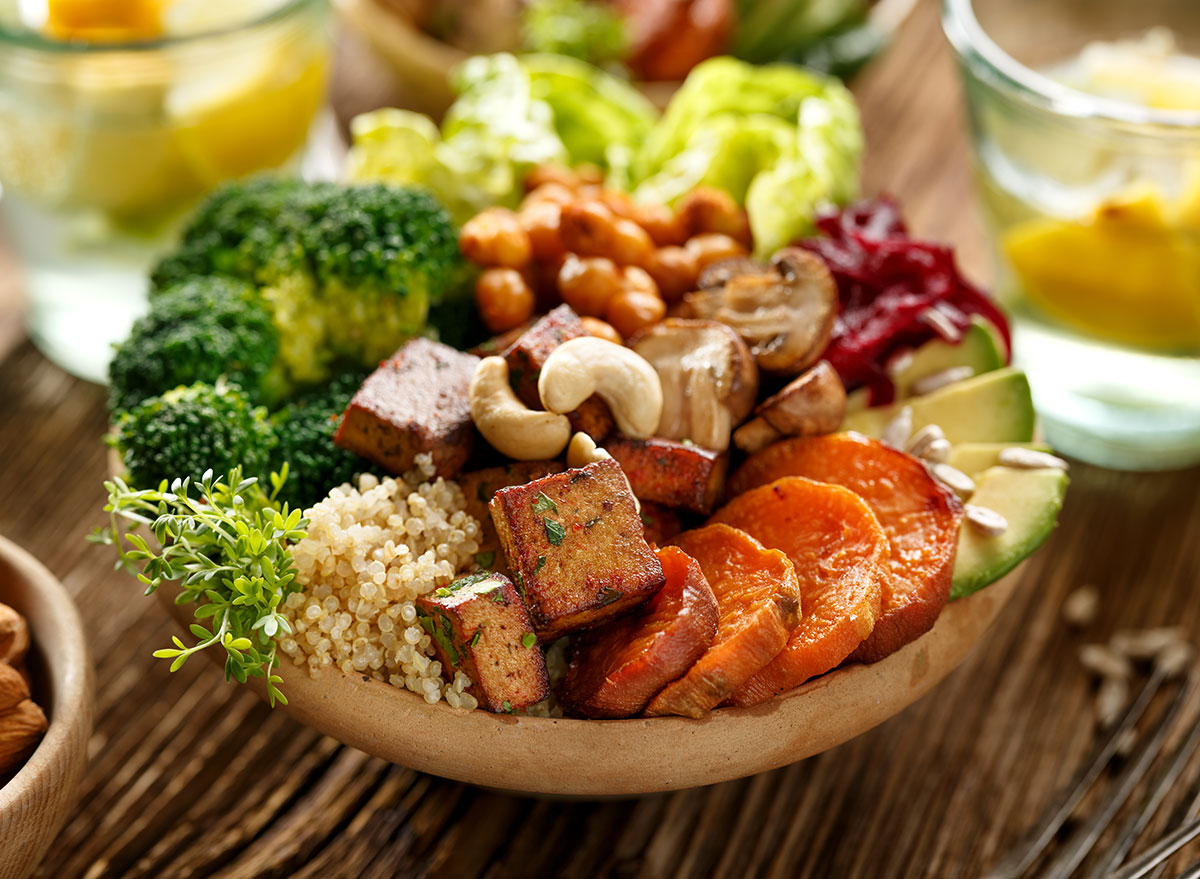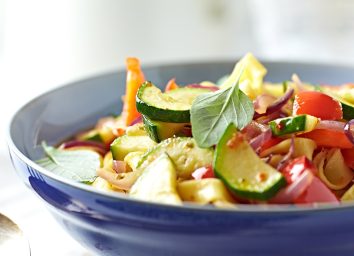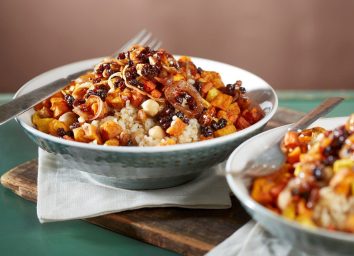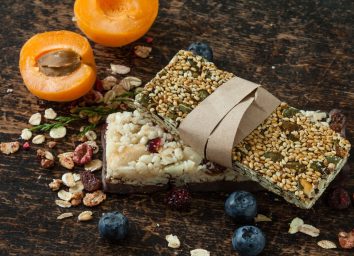Plant-Based Diet Guide: Explore the Benefits, Nutrition, and Food List You Need to Know

Picture this: You’re passing by a trendy new fast-casual eatery with a sign in the window that reads “plant-based paradise.” Or, you flip through a magazine and discover that one of your favorite celebs or fitness gurus happens to follow a plant-based approach to eating. Odds are, you’ve come across the plant-based diet at some point in recent years, and with good reason—it comes with a plethora of perks. But what does this buzzword even mean? Is it the same thing as a vegetarian or vegan diet? And if not, what can and can’t you eat on it?
A 2018 study conducted by OnePoll that evaluated the eating habits of 2,000 adults found that nearly three in five (59 percent) Americans eat plant-based meals at least once a day. Not only that, but over half (52 percent) of the survey participants reported that they are currently trying to incorporate more plant-based meals into their daily lives. Meanwhile, 37 percent said they’ve reduced their meat consumption, and another 33 percent said they’ve reduced their dairy consumption.
Even NFL quarterback Tom Brady of the New England Patriots follows a plant-based diet to stay in tip-top shape on the field. A CBS News interview with the pro athlete revealed that a whopping 80 percent of his diet consists of fruits and vegetables—and a solid portion of the other 20 percent consists of lean meats, like poultry.
If a plant-based diet is good enough for an elite athlete, it’s worth a shot, right? There’s a lot to consider before trying out or starting a plant-based diet. Here’s everything you need to know about a plant-based lifestyle—and how it could benefit you.
What is a plant-based diet?
Sherene Chou, RDN for NutriBullet, reports that only 1 in 10 adults manage to meet the daily recommendations for fruit and vegetable consumption. Fortunately, a plant-based diet is an easy and effective way to avoid this issue—and there are several different ways to approach it.
According to Andrew Weil, M.D. and founder of True Food Kitchen, the basic principles of the plant-based diet are to incorporate as many whole, minimally processed foods as possible into your diet, while also limiting animal products at the same time.
What can you eat on a plant-based diet?
As the name suggests, a plant-based diet means filling your plate mainly with foods from plants—like veggies, whole grains, and nuts. It also means minimizing how much meat and dairy you eat.
According to Hillary Cecere, RD/N of Eat Clean Bro, and Monica Auslander Moreno, RD, LD/N, and nutrition consultant for RSP Nutrition, the staples of a plant-based diet include:
- Vegetables (all kinds)
- Fruits (all kinds)
- Tubers (potatoes, yams, etc.)
- Whole grains (oats, brown rice, millet, bulgur wheat, quinoa, corn, farro, etc.)
- Plant-based oils and fats (olive oil, coconut oil, sesame oil, avocado, etc.)
- Nuts (almonds, walnuts, pistachios, pecans, cashews, etc.)
- Seeds (pumpkin seeds, sunflower seeds, hemp seeds, etc.)
- Legumes (chickpeas, lentils, peanuts, etc.)
- Beans (kidney beans, edamame, black beans, etc.)
- Spices (ginger, cumin, turmeric, paprika, etc.)
- Herbs (parsley, basil, oregano, etc.)
Randy Evans, RD, LD, and consultant for Fresh n’ Lean, notes that a plant-based diet means paying extra attention to the quality of the food you’re eating. That means seeking out locally sourced, organic produce whenever possible, looking for cold-pressed oils with no chemical processing, and choosing nuts and nut butters without any additives or preservatives.
“Your food should preferably be minimally processed,” Dr. Weil says. “Vegetables, for example, are best raw, lightly steamed, roasted, or quickly sautéed. Grains, as much as possible, should be consumed intact or broken into large pieces, not ground into flour. That gives enzymes easy access to the starch within the grain to convert it to glucose, thus spiking blood sugar.”
Dr. Weil also notes that some tropical fruits (like bananas and pineapples) should be eaten in moderation, as they can elevate your blood sugar dramatically. “Stick with low-glycemic-load fruits, with an emphasis on berries,” he says. “People with blood sugar issues should eat even these sparingly.”
While some people on a plant-based diet go meat-free, it’s not necessarily a requirement. However, your meals should primarily center around plants—with meat and dairy serving merely as an occasional compliment. When you do consume animal products, opt for smaller quantities. Samantha Presicci, LD, CPT, and the leading RD at Snap Kitchen, advises aiming for a maximum of 3 to 6 ounces of animal-based protein (depending on your body size and activity level) at any given meal. Additionally, Evans strongly suggests selecting grass-fed/free-range and organic meat, poultry, and eggs that do not contain antibiotics and growth hormones.
“It’s not a matter of eating or eliminating any one type of food or macronutrient,” explains Rachel Fine, RD and owner of To The Pointe Nutrition in NYC. “Rather, it’s a matter of choosing quality food sources. Carbohydrates that come from foods such as vegetables, fruit, legumes, beans, nuts, seeds, and grains are high in naturally occurring (intact) fibers and offer significantly more nutrition per bite. This is important because misconceptions exist when we look at highly processed foods that boast about being ‘high fiber’ (think: high fiber cereal and protein bars). These contain processed fibers, which lack additional nutrients and bioactive substances found in natural foods.”
In other words, the best way to reap the nutritional benefits of any food is to eat it in its whole, unprocessed form. So, while a bottled juice may contain lots of fruits and veggies, you’re better off eating those plants whole in order to get the most bang for your nutritional buck.
What can’t you eat on a plant-based diet?
Let’s be very clear—there’s nothing that’s entirely off-limits on a plant-based diet. That’s part of the reason why this approach to eating has become so popular—it’s a tad less restrictive than, say, veganism, the paleo diet, or Whole30.
That said, Dr. Weil says that once you’ve switched to a plant-based diet, you should minimize your consumption of animal products (including meat, poultry, and dairy) and avoid processed foods as much as possible.
“This would make certain foods off-limits, such as refined sugar and foods that contain cheap, highly inflammatory fats such as the refined soybean oil commonly used in packaged convenience foods and restaurant deep fryers,” he says.
As such, it’s always a good idea to look at the nutritional label on anything you buy that’s not a whole food. As a general rule, the shorter the ingredient list, the better.
Here are some foods to stay away from while on a plant-based diet:
- Anything with added sugars (commonly found in sodas, juices, flavored yogurts, ice cream, etc.)
- Artificial sweeteners (Splenda, Equal, Sweet’N Low, etc.)
- Refined grains (white bread, rice, and pasta)
- Packaged convenience foods (chips, cookies, frozen dinners, etc.)
- Processed vegetarian foods (soy-based frozen veggie burgers, faux meats, etc.)
- Processed meat (salami, sausage, bacon, beef jerky, etc.)
- Processed cheese
Is a plant-based diet different from a vegetarian or vegan one?
As the term “plant-based” has been steadily gaining steam, many people are still scratching their heads over whether it’s simply a synonym for vegetarianism or veganism.
Charles Stahler, co-founder, and co-director of the Vegetarian Resource Group, has examined dozens of scientific studies on plant-based diets, and what he discovered is that the definitions can vary widely. Many researchers, restaurants, and food companies use the term plant-based interchangeably with vegetarian or vegan, further confusing matters.
So, let’s clear this up: While vegetarian and vegan diets are obviously plant-based, not all plant-based diets exclude meat, dairy, and other animal products.
The vegetarian and vegan diet is super clear-cut—meat, poultry, and seafood are off the table in the former, while all animal products (including dairy, eggs, honey, etc.) are not allowed on the latter. However, a plant-based diet leaves more wiggle room. It involves increasing your intake of plants and minimally processed foods and decreasing your consumption of animal products—but there are so many different ways to interpret that. It could mean eliminating meat and only occasionally eating dairy products. Or, it could mean not cutting out any animal products completely, but limiting your consumption of these foods to just once or twice a week. For example, Dr. Weil abides by a plant-based diet that includes seafood (also known as pescetarianism). In addition to filling his plate with plants on a daily basis, he eats fish three to five times a week.
“Just because someone is vegan, that doesn’t mean they’re eating mostly plant-based,” Presicci says. “There are some vegans and vegetarians who eat heavily processed products on a daily basis. Those who are plant-based are simply focused on eating real food that predominantly comes from plants, but may still eat animal products.”
What are the benefits?
The advantages of going plant-based are plentiful—not only has research shown that this diet can be effective for weight loss, but that it can also reduce your risk of certain types of cancer, cognitive decline and/or dementia, and heart disease.
But that’s not all.
“Plants, especially fruits and veggies, tend to be some of the most nutrient-dense foods we know of,” says Emmie Satrazemis, RD and director at Nutrition Trifecta. “Eating nutrient-dense whole foods can improve your overall nutrition intake, which plays a role in managing your appetite, mood, energy levels, and potentially your body weight through calorie control.”
Daniela Novotny, an RD and wellness consultant at Missouri State University, notes that one of the main reasons why focusing on incorporating more plants into your diet is so beneficial is that it boosts your intake of fiber, both water- and fat-soluble vitamins, and minerals.
“Fiber can help to lower blood cholesterol levels, increase satisfaction/satiety, lower the risk of diabetes, and improve gastrointestinal health,” she says. “Likewise, plant-based foods contain many forms of antioxidants and phytochemicals, which can protect the body from oxidative damage and inflammation. Another point to consider is that decreasing animal products often leads to less intake of saturated fat and dietary cholesterol, both of which have associations with heart disease.”
Not only that, but Alexandra Salcedo, RD/N and cardiac rehab dietitian at UC San Diego Health, points out that a plant-based diet is also an environmentally-friendly option because it reduces your carbon footprint. In fact, a 2016 study published in PloS One revealed that switching to a plant-based diet could reduce greenhouse gas emissions and land use by a whopping 70 percent, and water use by 50 percent.
What are the drawbacks?
There are next to no disadvantages of a plant-based diet. However, it’s worth noting that adopting this approach does require a few special considerations.
For one, Salcedo points out that you’ll need to be a bit more diligent about planning your meals ahead of time when traveling or eating out. Also, it’s worth noting that depending on how restrictive your plant-based diet is, it may be more difficult to get your daily recommended intake of certain vitamins and minerals. This is especially true if you adopt a vegan diet.
To ensure you’re getting all the nutrients your body needs, Cecere and Salcedo recommend making an effort to consume a wide variety of vegetables, fruits, beans, legumes, nuts, seeds, and whole grains. Think of it this way: The more diverse the colors on your plate, the better.
Here are some specific nutrients that may be lacking in a plant-based diet, and tips on how to ramp up your intake:
Vitamin B12: According to Dr. Weil, this vitamin is only found naturally in animal-sourced foods, but vegans can get sufficient amounts from fortified breakfast cereals, fortified soy milk, and some types of nutritional yeast. He recommends taking a supplement of 50 to 100 micrograms in the form of a multivitamin, sublingual tablet, nasal spray, or gel.
Iron: While the most bioavailable form of iron is found only in meat, poultry, seafood, and fish, Dr. Weil notes that non-heme iron can be found in many plant-based foods (like certain whole grains, vegetables, and nuts). He suggests taking 200 to 250 milligrams of vitamin C or eating vitamin C-rich foods when consuming iron, as this vitamin helps your body to absorb the mineral more effectively. (Note: Do not take iron supplements unless prescribed by a physician.)
Essential fatty acids: Fish, pasture-raised beef, and eggs are excellent sources of omega-3 fatty acids, but if you don’t eat these foods, Dr. Weil recommends seeking out other plant-based sources, like ground flax seeds and hemp seeds, walnuts, and whole grains. Given that some of the omega-3s that come from plants are not as easily absorbed by the body, Danielle Schaub, RD and nutrition and culinary manager for Territory Foods, advises taking a fish oil supplement.
Vitamin D: According to Dr. Weil, the best sources of vitamin D are eggs, salmon, tuna, mackerel, and sardines, but vegans and vegetarians can look for fortified soy milk and cereals. Because most adults have a deficiency in this vitamin anyway, he also recommends that anyone on a plant-based diet take a daily supplement of 2,000 IU of vitamin D3.
Keep in mind that it’s always a good idea to talk to your doctor before incorporating any supplements into your diet, or adopting a plant-based diet, as a medical professional can provide personalized guidance that takes your physical condition, health concerns, and current medications into account.
“People who have not eaten a plant-based diet should transition slowly as it can take our bodies a while to adjust,” Evans says.
Fortunately, there are many different ways to ease into a plant-based diet. You might start by trying to stick to Meatless Mondays and ditching processed foods. From there, you can focus on making sure you fill two-thirds of your plate with plant foods. Most importantly, however, is to remember to find some joy in your new plant-based way of living. Challenge yourself to cook a new vegetable, whole grain, or legume every week, buy a plant-based cookbook and start experimenting with a friend, or ask your family to join you at a local plant-based restaurant. By making the plant-based diet your own, you’ll no doubt make the transition far more enjoyable.








